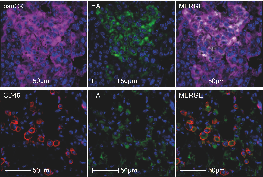12/05/2023
In a recent paper published in Cancer Immunology Research, Prof. Isabelle Cremer’s team shows in animal models of lung cancer that acute influenza virus infection has a long-term effect on the tumor microenvironment, impacting antitumor immune responses, tumor progression and survival, with implications for the prophylactic and therapeutic management of lung cancer patients.
The team first studied the impact of influenza A virus viral load on cancer progression and on cellular and molecular actors in the tumor environment. In this environment, immune cells are present whose role is to destroy tumor cells. Researchers have shown that Influenza A virus infects both tumor and immune cells, resulting in a long-term pro-tumor effect in tumor-bearing animal models. Mechanistically, influenza virus infection impairs the anti-tumor response of T cells, leading to their depletion. In addition, the team showed that influenza virus infection alters the expression of genes involved in immunosuppression, carcinogenesis and metabolism of chemotherapy molecules, which may induce resistance to antitumor treatments. This characteristic gene expression profile has also been found in a cohort of patients with lung adenocarcinoma and is correlated with poor survival.

In conclusion, these results show that influenza virus infection worsens lung tumor progression by reprogramming the tumor microenvironment to be more aggressive. They demonstrate the importance of annual influenza vaccination for lung cancer patients and their families. This inexpensive and relatively safe preventive measure, as well as the early initiation of antiviral treatment in case of influenza, should be strongly recommended in this high-risk population, their relatives and healthcare providers.
These results were the subject of a press release issued by Université Paris Cité, and an article on the Inserm website.
Contact:
Isabelle Cremer, director of the “Inflammation, complement and cancer” team at the Centre de Recherche des Cordeliers.

